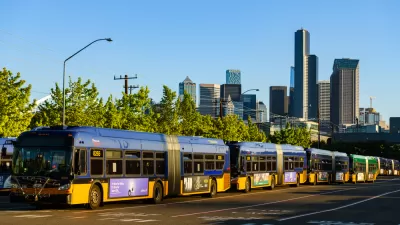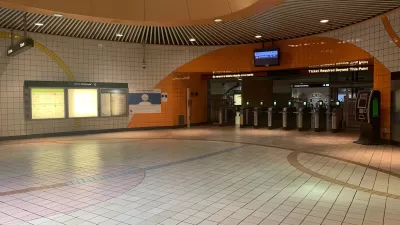The District may soon remove criminal penalties from fare evasion with a proposal that would lower fines and strike the possibility of jail time.

In the past year, officials in New York, Washington state, and California have relaxed the consequences to fare evasion, or decriminalized it altogether; in Cleveland, enforcement duties were recently transferred from police to civilian inspectors. In light of another decriminalization proposal in D.C., the Washington Post's Martine Powers looks into why some lawmakers are backing down from the broken windows approach to transit fares.
"Targeted enforcement campaigns are bound to ensnare poor and low-income people who don’t have the money to pay their fares — let alone fines," Powers explains. Cracking down on a crime of poverty through steep fines—or with police encounters, a major predictor of police killings—is not only inequitable, lawmakers argue, but also impractical: The resources needed to prosecute the minor offense are less likely to be recouped, while taking no action has yet to yield negative consequences.
FULL STORY: Here’s why some lawmakers are pushing back against fare evasion crackdowns

Study: Maui’s Plan to Convert Vacation Rentals to Long-Term Housing Could Cause Nearly $1 Billion Economic Loss
The plan would reduce visitor accommodation by 25,% resulting in 1,900 jobs lost.

North Texas Transit Leaders Tout Benefits of TOD for Growing Region
At a summit focused on transit-oriented development, policymakers discussed how North Texas’ expanded light rail system can serve as a tool for economic growth.

Why Should We Subsidize Public Transportation?
Many public transit agencies face financial stress due to rising costs, declining fare revenue, and declining subsidies. Transit advocates must provide a strong business case for increasing public transit funding.

How to Make US Trains Faster
Changes to boarding platforms and a switch to electric trains could improve U.S. passenger rail service without the added cost of high-speed rail.

Columbia’s Revitalized ‘Loop’ Is a Hub for Local Entrepreneurs
A focus on small businesses is helping a commercial corridor in Columbia, Missouri thrive.

Invasive Insect Threatens Minnesota’s Ash Forests
The Emerald Ash Borer is a rapidly spreading invasive pest threatening Minnesota’s ash trees, and homeowners are encouraged to plant diverse replacement species, avoid moving ash firewood, and monitor for signs of infestation.
Urban Design for Planners 1: Software Tools
This six-course series explores essential urban design concepts using open source software and equips planners with the tools they need to participate fully in the urban design process.
Planning for Universal Design
Learn the tools for implementing Universal Design in planning regulations.
Ascent Environmental
Borough of Carlisle
Institute for Housing and Urban Development Studies (IHS)
City of Grandview
Harvard GSD Executive Education
Toledo-Lucas County Plan Commissions
Salt Lake City
NYU Wagner Graduate School of Public Service





























